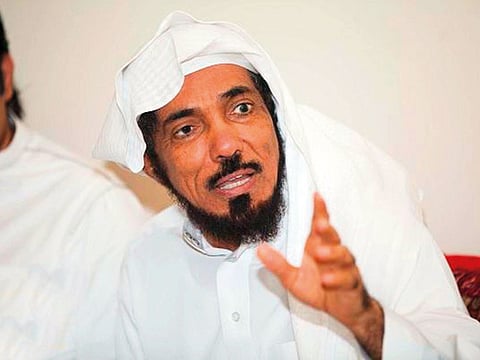Death penalty sought in Saudi cleric trial
Public prosecution submits 37 charges against Salman Al Awda

Manama: The trial of Saudi religious scholar Salman Al Awda opened today in the capital Riyadh in the presence of relatives and the media. The public prosecutor sought the death penalty.
The prosecution presented 37 charges against Al Awda, a prominent member of the International Union for Muslim Scholars, the organisation banned in Saudi Arabia and several other Arab countries.
Charges levelled against him included repeated attempts to destabilise the nation, revive sedition, incite the community against the rulers, and provoke unrest.
He is also accused of associating with personalities and organisations and holding meetings and conferences in Saudi Arabia and abroad in order to achieve the agenda of the Muslim Brotherhood against Saudi Arabia and its rulers.
The Brotherhood is banned in Saudi Arabia, other Gulf countries and Egypt.
Other charges, according to Saudi news site Sabq, were calling for changing the Saudi government, establishing the “caliphate” in the Arab world, and promoting it by bringing together youth as a nucleus to topple Arab regimes, holding meetings in several countries and delivering inciting lectures.
Al Awda is also accused of calling for the involvement of Saudi Arabia in foreign revolutions and for the kingdom’s support of revolutions in Arab countries. The prosecution said he circulated videos that supported the revolutions and highlighted internal deficiencies and injustices suffered by prisoners.
Al Awda was charged with membership in religious unions that clashed with the thoughts of respected senior scholars and sought to undermine the stability of Saudi Arabia and the Arab world. The unions supported revolutions and divisions and encouraged resistance to government, it said.
The prosecution cited the position of Al Awda as deputy to the secretary general of the International Union for Muslim Scholars, a man on terror lists.
Other charges were inciting public opinion and families of prisoners in security-related cased and calling for allowing prisoners to use media platforms.
In May 2017, Al Awda was among six foreign preachers blacklisted by Denmark and banned for at least two years after they were accused of spreading hatred.
The blacklist “sends a clear signal that travelling fanatical religious preachers who try to undermine our democracy and fundamental values of freedom and human rights are not welcome in Denmark,” the immigration and integration ministry said in its statement.
The centre-right Danish government said it decided in May 2016 to “establish a blacklist after a hidden-camera documentary exposed radical preachers in Danish mosques.”



